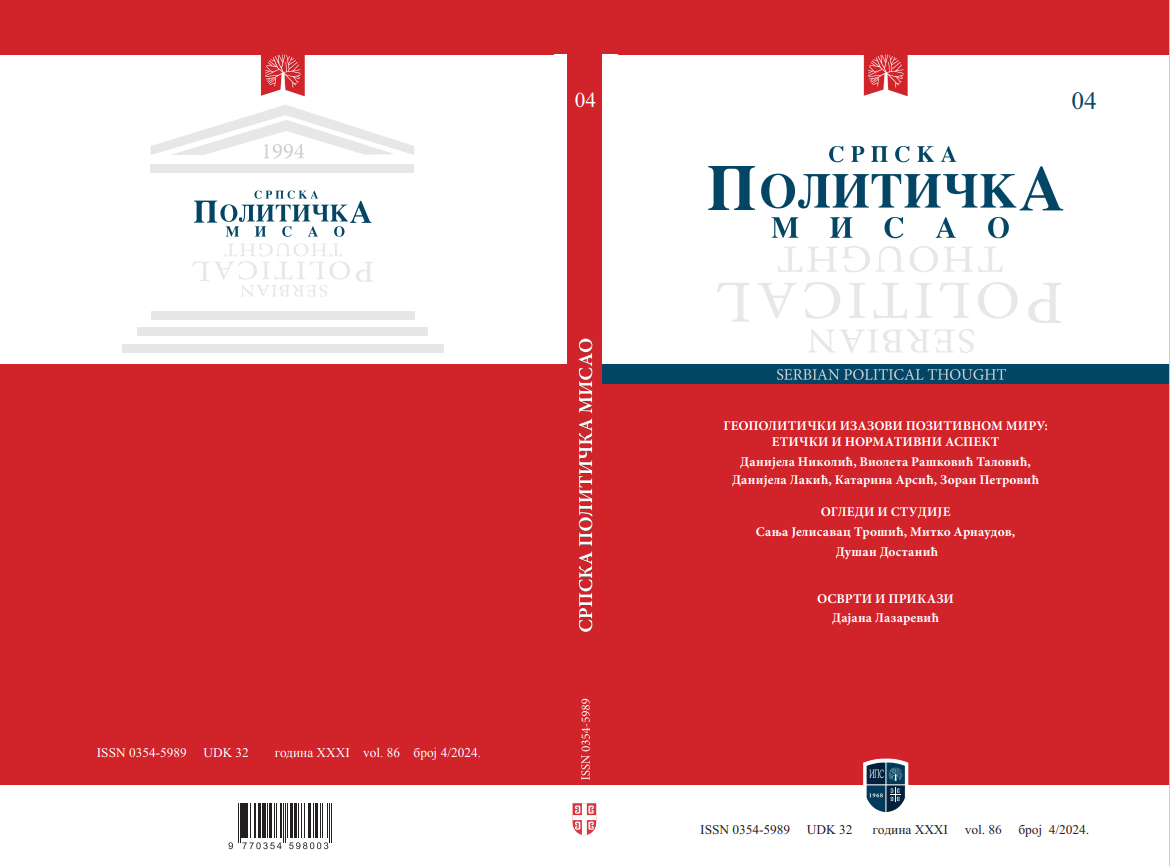THE DRAWBACK OF LIBERAL NATIONALISM AS A CONDITION FOR POSITIVE PEACE IN THE BALKANS
Abstract
The subject of the paper is liberal nationalism as the only acceptable form of nationalism for the Balkans, which has been imposed and allowed by the so-called great forces (the EU and the USA) after the end of the Cold War for this, from a political and ethnic aspect, unstable region. Liberal nationalism is an integral part of liberal peacebuilding, a dominant matrix on a global level, and it has been established as one of its strategies for building and maintaining positive peace, the conditions of normal functioning and the path of the Balkan countries towards the European Union. The paper first explains the concept of positive peace and provides an overview of the state in our region, and then it points to the central ideas of liberalism and nationalism as the foundations of liberal nationalism, whose features are stated thereafter. The focus of the paper is on the analysis of the shortcomings of liberal nationalism since political and ethnic crises in the Balkan countries in the last decade indicate that, in the imposed basis of peace in these societies, “something is not right”. As the most obvious drawback of the application of liberal nationalism in the Balkans, favoring political nation model has been identified, which is contrary to the history and specificities of Balkan peoples (it resulted in the projects such as the building of the so-called Bosnian and Montenegrin nation, which has deepened ethnic-identity conflicts as the basis of political crises endangering the functioning of these states).
In the concluding remarks, as a basic way to solve this drawback, or rather the illogicality, of liberal nationalism as a condition for positive peace in our region, focusing and returning to the cultural model of the nation is proposed because, firstly, this is the authentic feature of this type of nationalism, which is in accordance with its origin and characteristics, and secondly, the cultural-ethnic determination of the nation is the prevailing and authentic model of the nation in the Balkans. This idea about emphasizing the primary status of a cultural version of a nation refers to the aspect of liberal nationalism on the necessity of including national belonging, as an integral part of cultural belonging, in primary goods that the state ensures for its citizens, which means that liberal state cannot be fully ethnically neutral either. Furthermore, the cultural nation model, as an autochthonous feature of Balkan peoples, needs to be included more intensively in all the segments of liberal peacebuilding, whereby its adverse effects would be mitigated in the Balkans at least in part.
References
Antić, Čedomir, i Nenad Kecmanović. 2016. Istorija Republike Srpske. Beograd: Nedeljnik.
Baccarini, Elvio. 2008. „Liberalni nacionalizam: argument autonomije”. Prolegomena 7 (2):
-179.
Baccarini, Elvio. 2010. „Liberalni nacionalizam: argument samopoštovanja”. Filozofska istraživanja 30 (1-2): 295-310.
Džuverović, Nemanja. 2021. Studije mira: Sukob, mir i razvoj. Beograd: Fakultet političkih nauka.
Đurković, Miša. 2002. „Nacionalni identitet i liberalna demokratija”. U Liberalni nacionalizam. Jeal Tamir, 5-15. Beograd: Filip Višnjić.
Đurković, Miša. 2010. „Kako se konstruišu nacije: crnogorski slučaj”. Sociološki pregled. 44 (1): 3–36.
Fukuyama, Francis. 2022. „Liberalizmu jе potrebna nacija”. BUKA Magazin. 28. april 2022. https://6yka.com/kolumne/francis-fukuyama-liberalizmu-je-potrebna-nacija.
Galtung, Johan. 2009. Mirnim sredstvima do mira – mir i sukob, razvoj i civilizacija. Beograd: Jugoistok XXI i Službeni glasnik.
Gellner, Ernest. 1998. Nacije i nacionalizam. Zagreb: Politička kultura.
Global Peace Index 2023: Measuring Peace in a Complex World. Sydney: Institute for Economics & Peace. https://www.visionofhumanity.org/wp-content/uploads/2023/06/GPI-2023-Web.pdf.
Hejvud, Endru. 2004. Politika. Beograd: Clio.
Hejvud, Endru. 2005. Političke ideologije. Beograd: Zavod za udžbenike i nastavna sredstva.
Hobsbawm, Еric J. 1993. Nacije i nacionalizam. Zagreb: Novi Liber.
Kasapović, Mirjana. 2005. Bosna i Hercegovina: podijeljeno društvo i nestabilna država. Zagreb: Politička kultura.
Kymlicka, Will. 1989. Liberalism, Community and Culture. Oxford: Clarendon Press.
Kymlicka, Will. 2003. Multikulturalno građanstvo: Liberalna teorija manjinskih prava. Zagreb: Jasenski i Turk.
Lukić, Radomir D. 1995. Istorija političkih i pravnih teorija. Beograd: Zavod za udžbenike i nastavna sredstva i BIGZ.
Matić, Petar, i Miša Stojadinović. 2010. „Liberalni nacionalizam: u potrazi za izgubljenim identitetom”. Politička revija 23 (1): 187-210.
Mac Ginty, Roger, 2008. “Indigenous Peace-Making Versus the Liberal Peace“. Cooperation and Conflict 43 (2): 139-163. DOI:10.1177/0010836708089080
Papović, Biljana, i Milica Kovačević. 2021. Rast desničarskog ekstremizma u Crnoj Gori: Građanska država na ispitu. Podgorica: Centar za demokratsku tranziciju. https://www.cdtmn.org/analize/rast-desnicarskog-ekstremizma-u-crnoj-gori-gradanska-drzava-na-ispitu/
Positive Peace Report 2024: Analysing the factors that build, predict and sustain peace. Sydney: Institute for Economics & Peace. https://www.visionofhumanity.org/wp-content/uploads/2024/04/PPR-2024-web.pdf
Rawls, John. 2000. Politički liberalizam. Zagreb: KruZak.
Simović, Vlade. 2019. Narod, partije i demokratija u Bosni i Hercegovini. Banja Luka: Fakultet političkih nauka.
Smit, Antoni D. 1998. Nacionalni identitet. Beograd: Biblioteka XX vek.
Stanovčić, Vojislav. 2006. Politička teorija. Beograd: Službeni glasnik.
Stanković Pejnović, Vesna. 2010. „Identitet i multikulturalizam nacionalnih država na Balkanu”. Matica 9 (43): 127-156. http://www.maticacrnogorska.me/files/43/05%20vesna%20stankovic%20pejnovic.pdf
Stupar, Milorad. 2014. Filozofija politike. Beograd: Službeni glasnik.
Tamir, Jeal, 2002. Liberalni nacionalizam. Beograd: Filip Višnjić.
Veler, Hans-Ulrih. 2002. Nacionalizam. Novi Sad: Svetovi.
Vincent, Andrew. 2006. „Moć i praznina: nacionalistička ideologija u dvadesetom stoljeću”. U Političke ideologije, ur. Michael Freeden, 189-218. Zagreb: Algoritam.
Vujačić, Ilija. 2018. „Društvena integracija i etnokulturna različitost”. U Globalizam naspram nacionalizma. ur. Momir Đurović. 2 (146): 133-146. Podgorica: Crnogorska akademija nauka i umjetnosti. http://canupub.me/vb8i

